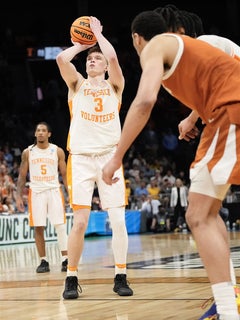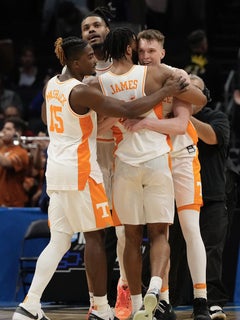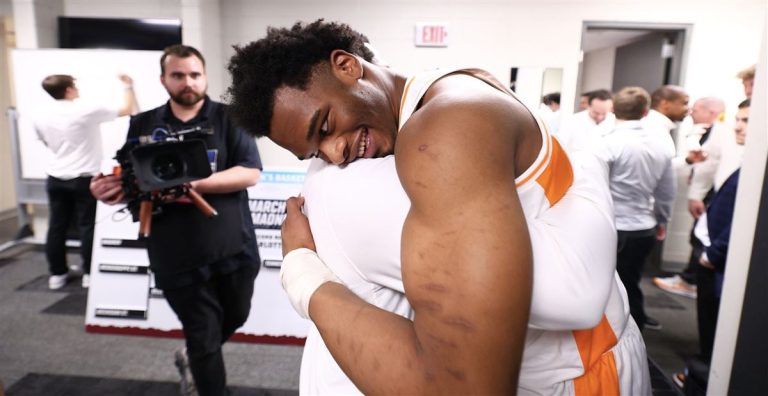Rick Barnes and his Vols dodged a series of cannonballs and slayed psychological dragons in their 62-58 win over Texas in a barroom basketbrawl to book their ticket back to the Sweet Sixteen of the NCAA Tournament.
This was the game Barnes never wanted, but it’s the one the script writers of the NCAA Tournament Selection Committee threw into his path, because of course they did. It was a third game in three seasons against Texas — the program Barnes took to 16 NCAA Tournaments but only one Final Four in 17 seasons; the program Barnes had to leave nearly a decade ago because the Longhorns’ then-athletic director told him to fire his staff or be fired himself; the program currently led and assisted by three proteges he considers sons; the program in the city where much of his family still lives.

Minimizing the stakes in this game was a task only for those most naive among us. Would a loss have cost Barnes his job? Of course not. But it would have made things uncomfortable heading into this offseason, and perhaps rightfully so. Tennessee has become a regular-season juggernaut under Barnes, but it has never advanced past the Sweet Sixteen of The Only Tournament That Matters To Most People, and it has eliminated a handful of times by lower-seeded teams.
Falling short in this tournament was Barnes’ only problem of consequence at Texas, and it’s been his only problem of consequence at Tennessee. And this is arguably the best and most complete team Barnes has had during his time in Knoxville. It’s a team with the best scoring guard in college basketball, one of the best point guards in college basketball and one of the best defenses in college basketball. It’s not a perfect team, but it’s a team good enough on paper to win this tournament.
This particular basketball team being upset in this particular tournament by that particular opponent would have been a nightmare for Barnes, and it would have led even the most sunny-side-up Tennessee fans to wonder whether this man could ever take this program to a Final Four. He would have needed to convince most of the team’s available-to-return players to return, and he would have needed to make serious moves in the transfer portal to inject the offense that will be left in the wake of consensus All-American Dalton Knecht’s departure to the NBA. Even then, though, there would be serious consternation — or, worse yet, apathy.
Could Barnes have bounced back from a loss Saturday? Perhaps.
Would you have placed a penny on it? Perhaps not.
This NCAA Tournament also is the final chance for fifth-year guards Josiah-Jordan James and Santiago Vescovi to cement their legacy as not just two of the winningest players in program history, but players who won when it mattered most. That’s something that means very much to both of them. They welcomed Knecht and fellow offense-first guard Jordan Gainey into the program with open arms and adjusted their roles with one goal in mind. They wanted to win a national championship. A first-weekend exit would have been brutal for them, and it would have been a real shame, considering everything they represent and everything they’ve done on and off the floor for the Tennessee program for a half-decade.
Let’s not kid ourselves into imagining that Saturday’s win ticked all those boxes. It ticked none of them. It kept a fairytale ending in play, though, and it in the short term it prevented the college basketball equivalent of a nuclear fallout.
Saturday’s win was a dodged cannonball for all those reasons, and for at least one more.
Winning a Round of 32 NCAA Tournament game despite shooting 3-of-25 from three-point range is something that heretofore felt impossible, at least in the small mind of this sportswriter. No team has any business winning a game of that magnitude in that way. No team in the history of this tournament had previously shot like that from three with 25-plus attempts and won a game. Not one. Until these Vols.

Tennessee on Saturday did what everyone in the front or back of their mind feared it would do at some point in this tournament. It hardly made a damn thing outside the paint, and it did that for a full 40 minutes. That same acidic script doomed this program to defeat many times in the postseason during the Barnes era, and it seemed for all the world that it was happening again in Charlotte.
A 12-point lead with less than 13 minutes dwindled and dwindled and dwindled, and it got down to three points at 45-42 with 7:11 left. The Vols held off the charge, though, and built the lead back to three scores at 53-44 with 4:23 left.
Back came Texas, though, and the deficit was back down to one score at 55-53 with 1:44 left. Tennessee wasn’t in the bonus, yet, either, so the Vols had multiple ways to lose the game at that point. They could just stop scoring altogether, or they could continue to hold a narrow lead in the final minute and be forced to make the front ends of one-and-one free throws.
The latter situation was the one that presented itself, with the first opportunity going to junior forward Jonas Aidoo — a 67.1 percent career free-throw shooting scarcely more than 60 percent his season. He made both of them, turning a one-point lead into a three-point lead with 24.3 seconds left. Tennessee then got a stop, and Knecht got the ball, and he went to the stripe for a one-and-one with 8.8 seconds left. He made both, which seemingly put the game out of reasonable reach at 60-55.
It wasn’t done, though, because it’s never done with Tennessee basketball in this tournament. Longhorns junior guard Tyrese Hunter hit a silly-long three to put make it 60-58 with 4.2 seconds left, and since Texas has committed just eight fouls, Knecht was again sent to the stripe for one-and-one with 3.0 seconds left.
Knecht — a solid but unspectacular 76.4 percent career free-throw shooter — again made both, and that was that.
On a night where nothing other than a layup and dunk felt like it would drop, players that had to be mentally and physically exhausted from an extremely physical game confidently stepped to the line and put the game away.

That was as survive-and-advance as it gets. Rarely had a 36-plus-minute lead ever felt so uncomfortable. Tennessee would have waltzed to a win over that Texas team if it had been just bad or really bad rather than unbelievably bad from behind the arc. An average night would have made things comfortable. A 5-for-25 night — a dreadful 20 percent — still would have made things somewhat comfortable. A 3-for-25 night made things really uncomfortable, but in fairness some of those makes came in the final six minutes. The Vols were 1-of-21 at one point.
Wins are wins, though, especially in March. Those who judge coaches only on their wins and losses in this tournament can’t criticize Barnes for close losses and then turn around and criticize him for close wins. No serious person would do that, and anyone who does it should be considered unserious. If this tournament really is all that matters, then any win over any decent team in this tournament deserves praise. If those are the parameters, those are the rules, and it’s as simple as that.
Teams that dodge bullets — or cannonballs — in this tournament often make special runs. We’ll see if Tennessee does that. If it doesn’t shooter better, though, its next game will be its last. If you think shooting 3-of-25 from three and beating Texas is tough, try doing that against Creighton. Do that against the Bluejays, and you lose, no matter how well you play on defense. That team can really shoot it, and it has a great rim protector on the other end of the floor.
But that challenge won’t come for another six days. The Vols can enjoy this win for one night, and fans can celebrate it for a bit longer than that.
Tennessee isn’t playing with house money from this point forward. This team and its coach did just clear a large psychological hurdle, though, and it showed tremendous physical and mental toughness down the stretch to do it. Those aren’t small things. Those are things worth savoring, if only for a bit.
